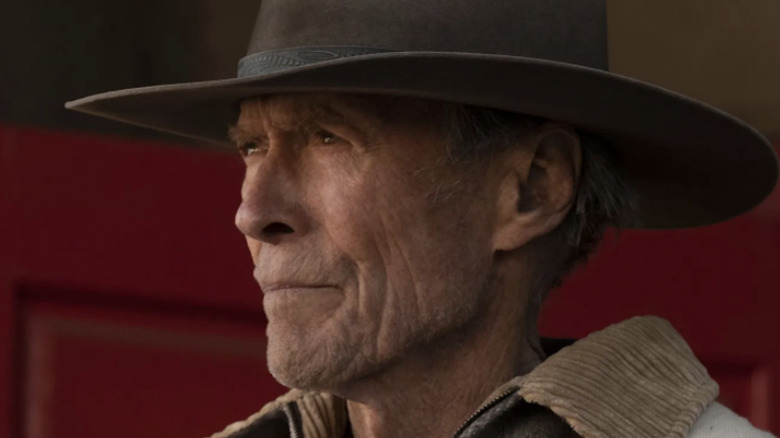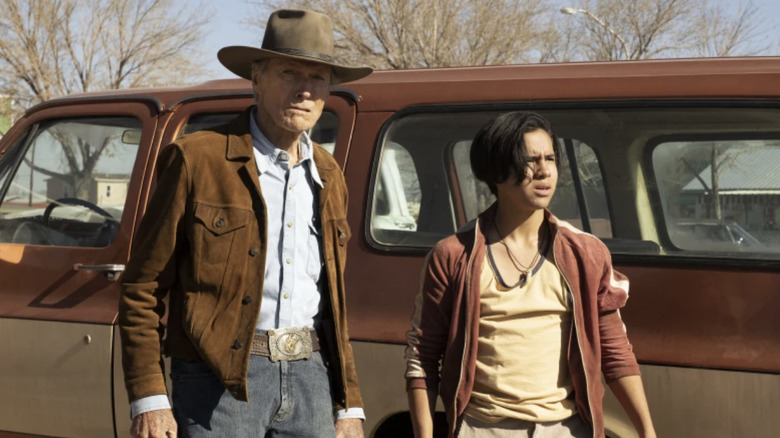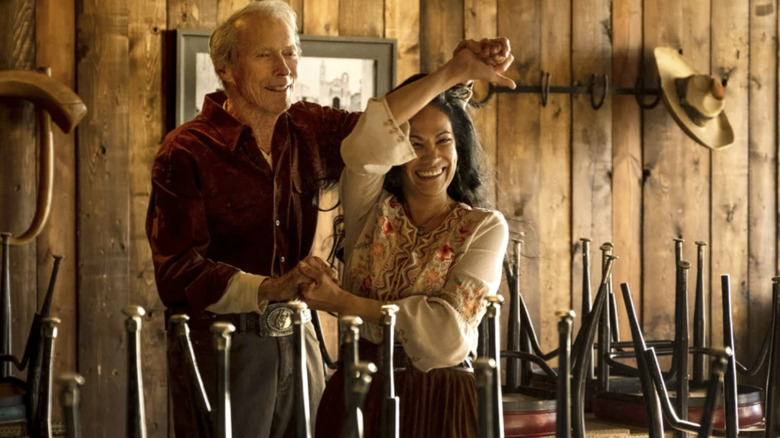Cry Macho Review: The Good, The Bad And The Ugly
There's never been anyone like Clint Eastwood, and there undoubtedly never will be again. Having defined multiple decades of masculinity since his days on the TV show "Rawhide," every generation of men since then has memories of their fathers taking them to see Eastwood's movies. Whether it was the "Man With No Name" films in the '60s, the "Dirty Harry" flicks in the '70s, tough, squinty Clint movies like "Heartbreak Ridge" in the '80s, or more modern classics like "Unforgiven" and "Gran Torino" (where he helped popularize the catchphrase of the modern elderly male: "Get off my lawn"), his influence over male machismo — and, in the eyes of some, toxic masculinity — is unrivaled.
Now, at age 91, he becomes the oldest director/lead actor in Hollywood history with "Cry Macho," a film that features his weary, gravel-laden face in nearly every scene. At an age when our society says you should be sitting in a Florida retirement home watching reruns of ... well, "Rawhide" ... Clint Eastwood is once again pushing back. With that in mind, reviewing "Cry Macho" is a strange experience, one that demands not only reflecting on the film itself but where it stands in the grand pantheon of messaging Eastwood has sent generations of men on what "macho" really means.
Set in 1979, the film opens with Eastwood's burned out, ex-rodeo star Mike Milo getting fired. Still feisty after all these years, the character takes it in stride. "Howard, I've always thought of you as a small, weak, and gutless man," he says to his boss, played menacingly as always by the underrated Dwight Yoakam. "But, you know, there's no reason to be rude."
A year later, Howard comes crawling back to Mike asking for a favor. He wants the old cowboy to head down to Mexico, grab his 13-year-old son away from his "nutcase" mom, and bring him back to America so Howard can "do the right thing." He mentions that the boy is supposedly being abused. Then he drops a key line on Eastwood's character, the sort of phrase that means so much to a certain generation but that simply wouldn't play out of the mouths of younger actors.
"You owe me, Mike," says Howard. "You gave me your word. And that used to mean something."
Eastwood's character echoes, "I owe ya," and those three words are all the motivation the movie needs for its impetus. In no time, Mike is in Mexico, tracking down Rafo (Eduardo Minett), a boy who seems like he's at the crossroads of life. Angry and alone, he's turned to a life of illegal cockfighting to earn money, and his prize possession is "Macho," a plucky rooster with a penchant for jumping into the faces of men who mess with Rafo.
"On the street, I trust no one," says the kid. "But it's safer than at home."
Macho, macho men
At this point, "Cry Macho" becomes a road movie, with Mike attempting to drive Rafo to the border so he can be reunited with his estranged father. Where's the tension, you might ask? Well, the Federales seem to be pursuing the pair, then they aren't, then they kinda are again. The boy's mother, Leta (Fernando Urrejola), has also sent a security guard after them, but he's as inept as he is motivationally challenged. Then there's Howard, who — simply by virtue of being played by Dwight Yoakam — always seems like he's up to no good.
The film is mainly an excuse to have our two couldn't-be-more-different characters to discuss matters of religion, race, and — most importantly — what it means to be a man.
"His name is Macho," the kid says of his chicken. "You know what macho means? It means strong." Later, Rafo watches a (clearly-stuntman-aided) Eastwood ride a bucking horse and marvels to himself, "Macho."
Nearing the end of the film, Rafo seems to have changed his tune but nevertheless sees himself as someone who wants to drink tequila and wear cowboy hats, and he sees Mike as a washed-up shell of his former self.
"You used to be strong, macho," the kid says. "Now you're nothing."
"Well, I used to be a lot of things," Eastwood grunts back. "But I'm not now. And I'll tell you something, this macho thing is overrated ... just people trying to be macho to show they've got grit. That's about all they end up with."
Is there something being said here? Most certainly. Is it anywhere near as profound, emotionally resonant or flat-out entertaining as "Unforgiven," the last time Eastwood wrote, directed, and supposedly gave his final word on the Western genre that made him a Hollywood titan? Not even close.
Eastwood has supposedly been flirting with this script for so long that he once suggested Robert Mitchum for the lead role. You would think with all that time, he could've punched it up a bit better. Many of the supporting actors recite exposition so transparent that you can see the gears of the plot turning and turning. In one scene, he drives for what looks like an entire evening before the boy (and his chicken) reveal that they've been hiding in the back seat of his car. There are multiple plot reveals that can be spotted a country mile away.
While Minett brings sincerity to his line readings, he's a bit clunky in his frequent ricochets from "gosh, golly" wide-eyed moments to dad-hating fits of anger. The film lacks the subtlety (at one point the kid sees a pair of cops and panics, as if every cop in Mexico is on the lookout for him) of Eastwood's better directorial efforts. "Cry Macho" also continues the mind-boggling trend (following Eastwood's dual three-way scenes in 2018's "The Mule") of women throwing themselves at a leading man who is approaching 100 years old, which feels less like a plot point (Urrejola, the lingerie-clad actress who tries to seduce Eastwood, was born in the '80s; Clint used to be in his 80s) and more like a running joke.
Flirty Harry
To the film's credit, a later sequence has a slightly older woman named Marta (an excellent Natalia Traven) also making bedroom eyes at Clint, but we later learn that she's a grandmother and more of a hand-holder looking for companionship. Their romance is sweet, punctuated by a lovely montage of them dancing in her cantina.
As a director, Eastwood certainly knows how to line up a shot. There are some beautiful images of his character driving down a Mexican road, with his old wagon accompanied by horses at full gallop, as well as his cowboy silhouette navigating the dark alleys of Mexico and a handover at the border of the young man central to the story. Almost as impressive as Eastwood's rock-steady performance is his continued dependability behind the camera.
And Macho gets the distinction of being Eastwood's most memorable animal co-star since Clyde the orangutan, and he might just be the most endearing movie chicken since Hei Hei from "Moana." Oh, and one more thing worth noting: If you're among the miniscule demographic who considers themselves a fan of bad Photoshop attempts in Hollywood films, this movie is chef's kiss. Not only are there laugh-out-loud pictures of young Eastwood awkwardly superimposed on wild, bucking horses, but at one point, Eastwood glimpses a picture of a young Dwight Yoakam, playing cowboy with his kid, that looks like somebody spent about 3 minutes whipping it up on their iPhone between takes.
The film's ending is weird, in that there really isn't one. As mentioned previously, the entire movie has an unmooring lack of tension or urgency — so much so, in fact, that it tricks you into thinking that there is some. But nope, it's all just a vehicle to get two characters — one a bit stereotypical, the other played by a face so iconic that Eastwood's baggage informs the character far more than any dialogue could — together to talk about the mysteries of life, death and being macho.
"It's like anything else in life. You think you've got all the answers," Eastwood tells the kid during one of the film's key moments. "Then you realize as you get older, you don't have any of them. By the time you figure it out, it's too late."
At age 91, Clint Eastwood still seems like he's got some things to figure out. He'll always be worth paying attention to — as an actor and a director — even if his message in a film like this is something he has said better elsewhere.


